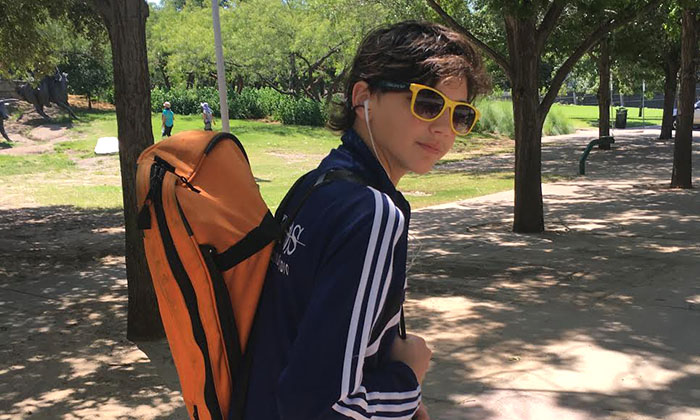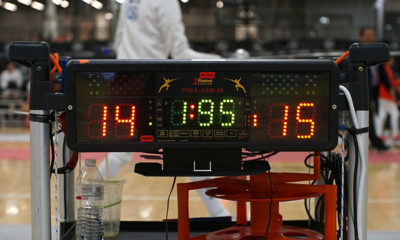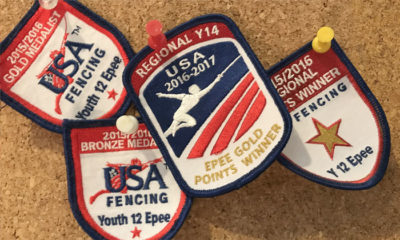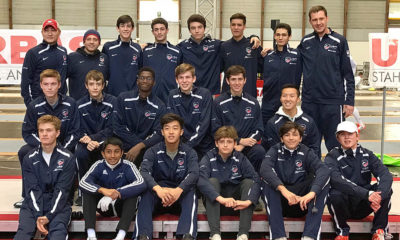
Kathryn’s son, Stafford, on his way to the venue at the 2016 Summer Nationals in Dallas, Texas.
“The Importance of Goals” deals with looking at the year ahead and laying out a sort of roadmap to follow, deciding on goals that are within reach and do-able.
But what makes them do-able? How you get from here to there? Medals, rankings, and ratings are important tangible evidence of success. But, you can’t get the results without putting in the effort. Personal goals or tasks that are within your fencer’s control can help keep your fencer moving forward even if and when those end goals remain somewhat elusive. Personal goals will help your fencer be successful whether winning or losing. And, setting them up and working on them will play an important role in helping your fencer reach those more tangible goals.
When my son started fencing, medals and competition were frankly not even a part of the conversation. My son was extremely shy as a young boy, something that he shares with a lot of fencers. At 8 years old, he basically lived in a hoodie, sometimes even two. He preferred not to speak up and when he did, you had to lean forward to hear. As a parent, I wanted to find a way, hopefully a fun way, to help him feel more confident. Fencing, I thought, might be a perfect solution. First of all, he gets to wear a mask (certainly more interesting than those two hoodies). Second of all, he gets to hold a sword. He liked Star Wars, so, I reasoned; let’s give it a shot.
Our first fencing goals had nothing to do with medals, rankings, points, etc. These goals had little to do even with fencing. The main goal at that time was for Stafford to be more confident and assertive. How do you get there?
One of Staff’s first basic tasks he set for himself in fencing was to literally be able to stay on the strip when fencing. It was more comfortable to walk off the end of the strip when a fencer came towards him, which was a direct result of not being able or willing to assert himself. At one of my son’s very first tournaments, Staff walked backwards off the end of the strip giving his opponent a point. His coach, who was watching, said, “Don’t walk off the end of a strip again. That is like quitting. Worse, it is like you are hitting yourself. If your opponent is going to get a point, make it one he has to earn.” Right then and there, Staff made that a goal. It was on his mind every time he fenced. I think that was maybe the last time Staff walked off the end to avoid a touch. Now, it is so ingrained in his fencing that he no longer even thinks about it. That’s not to say he hasn’t heard, “One foot! One foot! Go forward!” during a bout to make him aware that he is at the end, but I swear that foot has stayed glued on the strip every time until he has been able to take that step forward again. That goal certainly helped him become more assertive. I can remember him, after losing a bout during those early tournaments, saying, “Well, at least I didn’t walk off the strip!” Even though he lost, he knew a way in which he had also triumphed. And he could name it, which is important. It was a specific task that he had set for himself.
These tasks are important because they are under the fencer’s control. They can be something that helps your fencer prepare for competition, and they can be tasks your fencer wants to accomplish on the strip. And they are not dependent on results.
Stafford is always working on something in his fencing. Whether it is a specific flick of the wrist, or keeping emotions under control, he has his hands full. He is a teen-age boy, and as he gets into those teen years, he’s got growing pains, which make life and fencing so much more complicated. Certainly the fact that his shoe size went from 8 to 12 in four months makes fencing more complicated. Anyone who has seen a German Shepard puppy get tangled up with his own paws can imagine how a 14-year old can have problems. With suddenly huge feet and a wing span that seems to rival a 747, he has a lunge and reach that keep changing, and constantly is having to re-evaluate the distance between him and the other fencer on the strip. Very frustrating.
The teen years are complicated by emotional growing pains as well. Life in high school just becomes complicated and more emotional, right? Stakes for everything seem higher, and trying to navigate socially, trying to be “cool,” and survive through a day at school without somehow attracting negative attention, can become the goal for the day. There are the pressures of schoolwork, and those college conversations are starting. Pile on top of all of that, the emotions swirling around winning and losing in fencing, so much focused on just 15 minutes, and yet we expect our teenagers to control all of those emotions and conduct themselves at such a heightened level. As I write this, I am thinking, wow, that is asking a lot. How on earth can my son deal with all of this? Yet, I will still ask that of my son. More important, he asks this of himself. That is part of the game he signed up for. We talk about these pressures and ways he might help get prepared when those emotions seem to get the better of him on the strip. Frustration can easily turn to anger, when a touch is missed or the score, seemingly a done deal, suddenly tips the other way in a matter of seconds.
One thing that helps when that frustration is overwhelming, is to have enough physical stamina and muscle memory solid enough that even when your brain freezes, your hand does not. So, personal tasks include ways to get in great shape, and also ways to increase muscle memory – to just fence, not think. My son works on his point control on his own every day. There is a golf ball on a string, permanently tied to an overhead light in our living room. Every day it is lowered to chest level so he can practice his point control. Different kinds of touches. Over and over and over again.
In addition to improving his coordination and muscle memory, some of Staff’s personal tasks focus on controlling his emotions, not getting frustrated, and, hand in hand with that, being patient. There is an older fencer Staff really admires because he has such control over his emotions. Staff likes that he can’t tell when this fencer finishes a bout, if he has won or lost. When Staff fences these days, he tries to stay calm and just focus on the touch. Whether he wins or loses the bout, if he is able to accomplish keeping his emotions under control, he has won. It is of course difficult to work on this if he’s not actually competing. Situational bouts in class can’t really provide that rush of nerves and emotion. So right now, we are going to every tournament we can, RYCs, Opens, NACs, etc. Putting him in the situation where he can work on these issues. Opens, by the way, are great for this. Senior fencers bring a different type of experience and strength to the strip. They want to win of course, but they go about it a bit differently. What they might lack in pure teen adrenaline, they make up for in strength, strategy, and patience. In class, his coach is also great at setting up situations, “fencers on this side of the room are down 10- 14,” etc. But nothing really compares to keeping your head in battle, so to speak.
Right now, Staff has those tangible, specific goals he wants to reach this year. He now wants to qualify for the next World Cup. He would like to medal in Cadet at a NAC. In addition, he has personal tasks that he is responsible for. He has a daily workout routine. He has an agenda for his practice bouts in class and during open fencing. I am sure he has other personal goals that I don’t even know about. I hope so. At the end of each day, he wants to be able to say he did something that day to become stronger, faster, better. These tasks help him become more confident, more self-determined. He is already a winner, regardless of the score.













